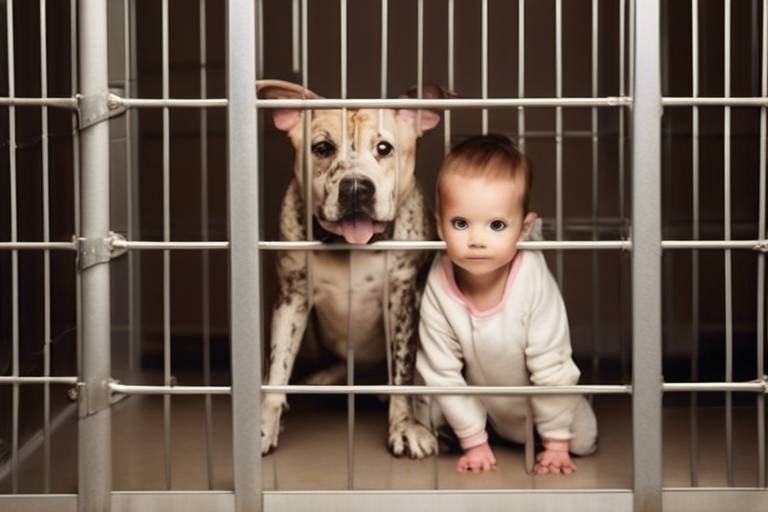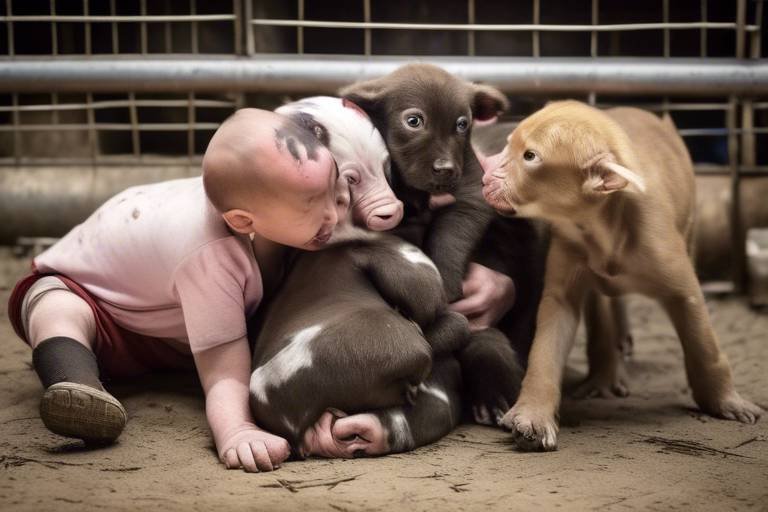The Importance of Regular Checkups for Adopted Pets
Adopting a pet is an incredibly rewarding experience, but it also comes with a set of responsibilities that every pet owner must embrace wholeheartedly. One of the most crucial aspects of ensuring the well-being of your newly adopted furry friend is scheduling regular veterinary checkups. These visits are not just routine; they are essential for monitoring your pet's health, identifying potential issues early, and tailoring a healthcare plan that meets their unique needs. Imagine your pet as a delicate flower, needing the right amount of sunlight, water, and care to thrive. Just like that flower, your adopted pet requires consistent attention to flourish and lead a happy, healthy life.
Many adopted pets come with unknown medical histories, which can make it challenging to gauge their health right from the start. Regular checkups serve as a vital tool in uncovering any hidden health concerns, allowing veterinarians to develop a personalized healthcare strategy. Think of it as a roadmap that guides you through the journey of your pet's health. By identifying pre-existing conditions, you can take proactive steps to manage them, ensuring a longer and healthier life for your furry companion.
Moreover, these checkups are not only about addressing existing health issues; they play a significant role in preventive care. Just like we go for annual physicals to catch potential health problems early, our pets need the same kind of attention. During these visits, your veterinarian will conduct a thorough examination, which may include:
- Routine vaccinations to protect against common diseases
- Dental checkups to prevent oral health issues
- Parasite prevention to keep your pet free from harmful infestations
By investing time in regular checkups, you significantly reduce the risk of serious health issues down the road, much like how regular maintenance on a car can prevent breakdowns and costly repairs.
When you adopt a pet, you’re not just gaining a new friend; you’re also taking on the responsibility of understanding their unique health needs. Each pet is different, and their backgrounds can greatly influence their health. Regular veterinary checkups help to identify any specific needs your pet may have, allowing you to provide the best possible care. It’s like being handed a puzzle with missing pieces; regular vet visits help you find those pieces and complete the picture of your pet’s health.
Preventive care is the cornerstone of a healthy life for adopted pets. Regular checkups provide a platform for essential vaccinations, dental care, and parasite prevention. By staying ahead of potential health issues, you’re not just reacting to problems as they arise; you’re actively working to prevent them. This proactive approach is akin to putting on a raincoat before stepping out into a storm—you’re prepared and protected.
Vaccinations are vital for protecting your pet from various diseases. Understanding the recommended vaccination schedule ensures that your adopted pet receives timely immunizations. This not only keeps them healthy but also protects other pets and people around them.
Core vaccines, such as rabies and distemper, are essential for all pets. Regular checkups ensure that your adopted pets are up-to-date on these crucial vaccinations, providing them with the protection they need to stay safe.
On the other hand, non-core vaccines are determined based on your pet's lifestyle and risk factors. Regular veterinary visits help assess whether these additional vaccinations are necessary, ensuring your pet is adequately protected based on their environment.
Dental health is often overlooked in pets, but it is just as important as any other aspect of their well-being. Regular checkups provide opportunities for dental examinations and cleanings, preventing serious dental issues that could affect your pet's overall health. Just like humans, pets can suffer from gum disease and tooth decay, which can lead to more severe health complications if left untreated.
Veterinary checkups also serve as an opportunity to assess the behavior of adopted pets. Understanding behavioral issues early can lead to better training and socialization strategies for a happier pet. Just as we might seek a therapist for emotional support, your pet can benefit from understanding their behavioral needs.
Adopted pets may experience stress from their past experiences. Regular checkups allow veterinarians to identify signs of anxiety or stress, enabling them to recommend appropriate interventions for improvement. Think of it as tuning into your pet’s emotional state, allowing you to provide the support they need to feel secure and loved.
Checkups provide insights into an adopted pet's socialization and training requirements. Addressing these needs early on can lead to a well-adjusted and confident companion. The earlier you can identify and address these issues, the better your relationship with your pet will be, creating a harmonious home environment.
Q: How often should I take my adopted pet for checkups?
A: Generally, it's recommended to have your pet checked at least once a year, but puppies and kittens may require more frequent visits.
Q: What should I expect during a veterinary checkup?
A: Expect a thorough physical examination, vaccinations, dental checks, and discussions about your pet's behavior and diet.
Q: Are there specific health concerns for adopted pets?
A: Yes, adopted pets may have unknown medical histories, which can include pre-existing conditions that need to be monitored closely.

Understanding the Unique Health Needs of Adopted Pets
Adopted pets often come with a mystery that can be both exciting and challenging. When you bring a furry friend into your home, you might not know their medical history, which is why regular veterinary checkups are essential. These visits can help uncover any hidden health issues that may not be immediately apparent. Just like people, pets can have a range of health conditions that can go unnoticed without proper monitoring. By scheduling regular checkups, you can tailor a healthcare plan that meets the specific needs of your adopted pet, ensuring a longer, healthier life.
One of the most important aspects of understanding your adopted pet's health is recognizing that they may have unique requirements. For instance, some rescue animals might have been exposed to various illnesses or might have had insufficient medical care in their previous environments. This can lead to a range of issues, from chronic conditions to behavioral problems. Regular checkups allow veterinarians to conduct comprehensive health assessments, including blood tests, physical examinations, and screenings for common diseases that could affect your pet's quality of life.
Moreover, it’s crucial to keep in mind that each pet is different. Factors such as breed, age, and previous living conditions play a significant role in determining their health needs. For example, certain breeds are predisposed to specific health conditions, while older pets might require more frequent monitoring for age-related issues. Regular veterinary visits not only help identify pre-existing conditions but also allow for adjustments in care as your pet ages. This proactive approach can significantly enhance their well-being and longevity.
In addition to physical health, mental well-being is also a key component of your adopted pet's overall health. Many rescue animals may have experienced trauma or neglect, and understanding their unique psychological needs is just as important as addressing their physical health. Regular checkups provide an opportunity for veterinarians to assess not only the physical state of your pet but also their behavioral health. This holistic approach ensures that all aspects of your pet's health are being monitored and managed effectively.
In summary, understanding the unique health needs of adopted pets is crucial for their overall well-being. Regular veterinary checkups are not just a routine; they are an essential part of ensuring that your pet lives a happy, healthy life. By staying informed about their health and addressing any concerns as they arise, you can provide a loving home where your furry friend can thrive.

The Role of Preventive Care
When it comes to the health of our beloved adopted pets, preventive care is not just a luxury; it's a necessity. Imagine your pet as a fragile flower in a garden; without proper care, it may wilt before its time. Regular veterinary checkups play a crucial role in maintaining your pet's health and well-being. These visits are an opportunity for veterinarians to assess your pet's overall condition, identify potential health issues early, and implement preventive measures that can significantly enhance their quality of life.
Preventive care encompasses a variety of services that can help keep your pet healthy and happy. From vaccinations to dental cleanings, these proactive steps can prevent serious health problems down the line. For instance, did you know that dental disease is one of the most common issues faced by pets? Regular checkups allow for dental examinations and cleanings, which can prevent painful conditions that not only affect your pet's mouth but can also lead to more severe health complications, such as heart disease.
Additionally, during these checkups, your veterinarian will discuss the importance of vaccinations. Vaccinations are like a shield against various diseases that can seriously harm your pet. They help your furry friend build immunity against common illnesses, ensuring they live a long and healthy life. Here’s a quick breakdown of the types of vaccines your pet may need:
| Type of Vaccine | Description |
|---|---|
| Core Vaccines | Essential for all pets, including rabies and distemper, to protect against severe diseases. |
| Non-Core Vaccines | Based on lifestyle and risk factors; may include vaccines for kennel cough or Lyme disease. |
Moreover, preventive care includes parasite prevention. Fleas, ticks, and worms can pose significant risks to your pet's health. Regular checkups allow your veterinarian to recommend the best preventive treatments tailored to your pet’s lifestyle. For example, if your adopted pet loves to romp around in the woods, it’s crucial to have a robust plan for tick prevention, as these little critters can transmit serious diseases.
In essence, preventive care is about being proactive rather than reactive. By investing time and resources into regular veterinary visits, you are not only safeguarding your pet’s health but also ensuring that you can enjoy many more years of companionship together. Remember, a healthy pet is a happy pet, and nothing beats the joy of seeing your furry friend thrive!
- How often should I take my adopted pet for checkups? It's generally recommended to have annual checkups for adult pets, while puppies and kittens may require more frequent visits.
- What should I expect during a preventive care visit? Expect a thorough examination, vaccinations, dental checks, and discussions about your pet's diet and behavior.
- Are preventive care services expensive? While there is a cost associated, the investment in preventive care can save you money in the long run by avoiding serious health issues.
Vaccination Schedules
When it comes to keeping our beloved adopted pets safe and healthy, understanding is paramount. Just like humans, pets require a series of vaccinations to protect them from various diseases that could pose serious health risks. Did you know that some diseases can be life-threatening? That's why staying on top of your pet's vaccination schedule is not just a good idea; it's essential! Regular veterinary checkups are your best ally in ensuring that your furry friend receives the right vaccines at the right times.
Typically, the vaccination schedule will vary based on several factors, including your pet's age, health status, and lifestyle. For instance, puppies and kittens often require a series of vaccinations during their first year of life, while adult pets may need boosters to maintain their immunity. Here’s a general overview of what you might expect for your adopted pet:
| Pet Age | Core Vaccines | Non-Core Vaccines |
|---|---|---|
| Puppies (6-8 weeks) | Distemper, Parvovirus | Bordetella (if in high-risk environments) |
| Puppies (10-12 weeks) | Rabies, Distemper, Parvovirus | Leptospirosis (based on risk) |
| Kittens (6-8 weeks) | Feline Viral Rhinotracheitis, Calicivirus, Panleukopenia | Feline Leukemia (based on risk) |
| Adult Pets | Rabies, Distemper, Parvovirus (for dogs) | Additional vaccines based on lifestyle |
Understanding this schedule can feel overwhelming, but it’s crucial to consult with your veterinarian to tailor a plan that meets your pet's specific needs. They will help you navigate through the maze of required and optional vaccines, ensuring that your pet is not only protected but also thriving. Remember, some pets may require additional vaccines based on their lifestyle or exposure to certain environments. For example, if your dog loves to socialize at dog parks, they might need the Bordetella vaccine to protect against kennel cough.
Moreover, keeping track of your pet's vaccination records is essential. It’s a good idea to maintain a dedicated folder or digital file containing all vaccination certificates. This not only helps you stay organized but also provides crucial information that could be needed for boarding, grooming, or travel. After all, who wants to scramble for paperwork when it’s time for a fun trip?
In conclusion, regular checkups and a solid understanding of vaccination schedules are vital for the health and longevity of your adopted pet. By staying informed and proactive, you can ensure that your furry family member leads a happy, healthy life. So, don’t hesitate to reach out to your veterinarian and discuss your pet’s vaccination needs today!
- How often should my pet receive vaccinations? - Generally, puppies and kittens need vaccinations every few weeks until they are about 16 weeks old, while adult pets require boosters annually or every three years, depending on the vaccine.
- Are there any side effects to vaccinations? - While most pets tolerate vaccines well, some may experience mild side effects like lethargy or a slight fever. Serious reactions are rare but should be reported to your vet immediately.
- Can my pet skip vaccinations? - Skipping vaccinations can leave your pet vulnerable to serious diseases. Always consult your vet about the necessity of each vaccine for your pet's specific situation.
Core Vaccines
When it comes to ensuring the health and safety of your adopted pet, play a pivotal role. These vaccines are considered essential for all pets, regardless of their breed or background. They protect against serious diseases that can be life-threatening and are crucial for your pet’s overall well-being. For instance, vaccines like rabies and distemper are not just recommended; they are often required by law in many areas. By keeping your adopted pet up-to-date on these vaccinations, you’re not only complying with regulations but also ensuring that they are shielded from infections that could lead to severe health issues.
One of the most significant aspects of core vaccines is the timing of their administration. Puppies and kittens typically start their vaccination schedule at a young age, often around six to eight weeks. This schedule continues every few weeks until they are about four months old. However, for adopted pets, especially those that might be older, it’s vital to consult with a veterinarian to assess their vaccination history and determine what they may need. A simple check-up can reveal if your pet is overdue for any core vaccines, allowing you to take immediate action.
In addition to rabies and distemper, other core vaccines may include parvovirus and adenovirus. These diseases can spread rapidly among unvaccinated animals and can have devastating effects. For example, canine parvovirus is notorious for causing severe gastrointestinal issues in dogs and can be fatal if not treated promptly. Similarly, feline viral rhinotracheitis can impact cats' respiratory health significantly. The good news is that these vaccines are highly effective and can provide long-lasting protection, making regular veterinary visits essential for your adopted pet.
Here’s a quick overview of core vaccines and their importance:
| Vaccine | Target Disease | Recommended Age for Administration |
|---|---|---|
| Rabies | Rabies Virus | 12-16 weeks |
| Distemper | Canine Distemper Virus | 6-8 weeks, then every 3-4 weeks until 16 weeks |
| Parvovirus | Canine Parvovirus | 6-8 weeks, then every 3-4 weeks until 16 weeks |
| Adenovirus | Canine Infectious Hepatitis | 6-8 weeks, then every 3-4 weeks until 16 weeks |
By understanding the importance of these core vaccines, you can take proactive steps to protect your adopted pet. Regular checkups will not only keep their vaccinations up-to-date but also provide peace of mind knowing that you are doing everything possible to ensure a long, healthy life for your furry friend. Remember, early detection and prevention are key in pet care, and your veterinarian is your best ally in this journey.
- How often should my adopted pet receive core vaccines? It is recommended to follow the vaccination schedule provided by your veterinarian, which typically involves initial vaccinations followed by boosters.
- Are there any side effects to core vaccines? Most pets experience mild side effects, such as soreness at the injection site or slight lethargy. Serious side effects are rare but should be reported to your vet immediately.
- What if my adopted pet has never been vaccinated? Consult your veterinarian for a tailored vaccination plan based on your pet's age, health status, and lifestyle.
Non-Core Vaccines
When we think about keeping our furry friends healthy, core vaccines often steal the spotlight. But let’s not forget about , which play an equally important role in safeguarding our adopted pets. These vaccines are not universally required; instead, they are tailored to the individual needs of pets based on their lifestyle, environment, and specific risk factors. Just like how we might choose to get a flu shot based on our personal health history or exposure risks, pets also benefit from a customized vaccination approach.
Non-core vaccines can protect against diseases that are less common but can still pose serious threats to our pets. For instance, if your adopted dog frequently interacts with other dogs at parks or doggy daycare, they may be at a higher risk for certain diseases, making non-core vaccines more relevant. Here are some examples of non-core vaccines that might be considered:
- Bordetella bronchiseptica: This vaccine helps prevent kennel cough, a highly contagious respiratory disease, particularly important for pets that socialize with others.
- Lyme disease: If you live in an area where ticks are prevalent, this vaccine can be crucial for preventing tick-borne illnesses.
- Canine influenza: Particularly relevant for pets that are often around large groups of other dogs, this vaccine can help prevent outbreaks of canine flu.
- Feline leukemia virus (FeLV): For cats that go outdoors or live with other cats, this vaccine can be a lifesaver against a serious viral infection.
Determining whether your adopted pet needs these non-core vaccines involves a thorough discussion with your veterinarian. During regular checkups, veterinarians assess your pet's lifestyle and living conditions, which can significantly influence the necessity of these vaccines. For example, if your cat is strictly indoors, the risk of exposure to certain diseases is lower, possibly making some non-core vaccines unnecessary. On the other hand, if your dog is an adventurous soul who loves to explore dog parks, then keeping up with these vaccines could be a game changer for their health.
Ultimately, the goal is to create a comprehensive healthcare plan that addresses both core and non-core vaccines. Regular veterinary visits not only ensure your pet is up-to-date on vaccinations but also provide an opportunity for early detection of any potential health issues. It’s all about creating a tailored approach to your pet’s health, ensuring they lead a long, happy, and healthy life.
1. What are non-core vaccines?
Non-core vaccines are vaccinations that are not universally required but may be recommended based on a pet's individual lifestyle, environment, and risk factors.
2. How do I know if my pet needs non-core vaccines?
Consulting with your veterinarian during regular checkups is the best way to determine whether your pet needs non-core vaccines. They will assess your pet's lifestyle and health history.
3. Are non-core vaccines safe for my pet?
Yes, non-core vaccines are safe and can provide important protection against specific diseases. Your veterinarian will discuss any potential risks and benefits with you.
4. How often should my pet receive non-core vaccines?
The frequency of non-core vaccines can vary based on the specific vaccine and your pet's lifestyle. Your veterinarian will provide a recommended schedule tailored to your pet's needs.
Dental Health Awareness
Dental health is often an overlooked aspect of pet care, yet it plays a crucial role in the overall well-being of our furry companions. Just like humans, pets can suffer from dental problems that can lead to serious health issues if left untreated. Regular veterinary checkups provide an excellent opportunity to examine your adopted pet's teeth and gums, ensuring that any potential issues are identified early on. Imagine your pet’s mouth as a gateway to their health; if that gateway is blocked by plaque and tartar, it can lead to a cascade of problems affecting not just the mouth but the entire body.
During these checkups, veterinarians can perform thorough dental examinations, looking for signs of gum disease, tooth decay, and other oral health issues. It’s essential to recognize that dental disease is not just a cosmetic concern; it can cause pain, infection, and even impact vital organs such as the heart and kidneys. According to the American Veterinary Dental College, nearly 80% of dogs and 70% of cats show signs of dental disease by the age of three. This statistic is alarming and highlights the need for proactive dental care.
So, what can you do to promote your pet's dental health? Here are some key practices to incorporate into your routine:
- Regular Brushing: Brush your pet’s teeth regularly using toothpaste specifically designed for pets.
- Dental Chews: Provide dental chews that can help reduce plaque and tartar build-up.
- Professional Cleanings: Schedule professional dental cleanings as recommended by your veterinarian.
By adopting these practices, you can significantly enhance your pet's dental health and, consequently, their overall health. Remember, maintaining your pet's dental hygiene is not just about fresh breath; it’s about ensuring they live a long, healthy, and happy life.
In conclusion, regular veterinary checkups are vital not only for vaccinations and general health assessments but also for addressing dental health. These checkups provide an opportunity to catch issues early, implement preventive measures, and ensure your adopted pet's mouth is as healthy as possible. After all, a healthy mouth contributes to a healthy body, and your beloved pet deserves nothing less.
- How often should I take my adopted pet for dental checkups? It's recommended to have your pet's dental health evaluated at least once a year during their annual checkup.
- What are the signs of dental disease in pets? Look for bad breath, swollen gums, difficulty eating, and excessive drooling. If you notice any of these signs, consult your veterinarian promptly.
- Can I brush my pet's teeth at home? Yes! Regular brushing at home is encouraged. Use pet-safe toothpaste and a toothbrush designed for pets.

Behavioral Assessments During Checkups
When you adopt a pet, you’re not just bringing home a furry friend; you’re also welcoming a unique personality into your life. Just like us, pets come with their own quirks, habits, and sometimes, hidden traumas. This is where behavioral assessments during veterinary checkups become vital. These assessments allow veterinarians to evaluate how your adopted pet interacts with their environment and with you, ensuring they are not only physically healthy but also emotionally well-adjusted.
Many adopted pets have experienced significant changes in their lives, which can lead to behavioral issues. Whether it's anxiety from being in a shelter, fear from past trauma, or simply the stress of adjusting to a new home, these factors can manifest in various ways. During a checkup, your vet can observe your pet's behavior and identify any signs of distress or anxiety. This is crucial, as early intervention can help mitigate more serious behavioral problems down the line.
For instance, if your new dog seems overly anxious or fearful during the visit, your veterinarian can provide insights and recommendations tailored to your pet's needs. They might suggest training techniques, behavior modification strategies, or even refer you to a professional animal behaviorist. This proactive approach can prevent issues such as aggression, excessive barking, or destructive behaviors, leading to a happier and more harmonious home.
One of the key aspects of behavioral assessments is recognizing signs of stress. Here are some common indicators that your pet may be feeling uneasy:
- Excessive panting or drooling: This could indicate anxiety, especially in stressful situations.
- Hiding or cowering: If your pet seeks out dark corners or tries to hide, they might be feeling overwhelmed.
- Aggressive behavior: Growling, snapping, or biting can be signs of fear or discomfort.
By addressing these signs early on, you can help your adopted pet feel more secure and confident in their new surroundings. Regular checkups not only provide a platform for these assessments but also foster a relationship between your pet and the veterinarian. This relationship can make future visits less stressful, as your pet becomes familiar with the vet's office and the people in it. Remember, a calm pet is a happy pet!
Moreover, behavioral assessments can also shed light on your pet's socialization needs. Some pets may require more interaction with other animals or people to build their confidence. Your veterinarian can guide you on how to facilitate positive experiences that promote social skills. Whether it’s through structured playdates, obedience classes, or simply more outings, these steps can significantly enhance your pet's quality of life.
In conclusion, behavioral assessments during veterinary checkups are essential for the well-being of adopted pets. They help identify any underlying issues and provide a roadmap for addressing them effectively. By investing time in understanding your pet's behavior, you are not only ensuring their health but also enriching your relationship with them. After all, a well-adjusted pet is a joy to have around, and regular checkups are a crucial part of that journey.
Q: How often should I take my adopted pet for checkups?
A: It's generally recommended to schedule a checkup at least once a year. However, if your pet has specific health concerns or behavioral issues, more frequent visits may be necessary.
Q: Can I ask my veterinarian about my pet's behavior during checkups?
A: Absolutely! Your veterinarian is there to help you understand your pet's needs, including behavioral concerns. Don't hesitate to bring up any observations you have.Q: What should I do if my pet shows signs of anxiety during vet visits?
A: Talk to your veterinarian about your concerns. They can suggest desensitization techniques, calming products, or even refer you to a behavior specialist.
Recognizing Signs of Stress
Just like us, our furry friends can experience stress, and recognizing the signs early is crucial for their well-being. Adopted pets often come from uncertain backgrounds, which can lead to anxiety and behavioral issues. So, how can you tell if your pet is feeling stressed? Look out for some common indicators. For instance, if your pet suddenly becomes withdrawn, hides away, or avoids interaction, these could be red flags. Similarly, excessive barking, growling, or even destructive behavior might signal that your pet is feeling overwhelmed.
Physical signs are equally important to monitor. If you notice your pet licking their lips excessively, panting without any apparent reason, or showing signs of aggression, it’s time to pay attention. Stress can manifest in various ways, and each pet may express it differently. For example, some pets might become clingy and seek constant attention, while others may retreat and isolate themselves. Understanding these differences is key to providing the right support.
One way to keep track of your pet's behavior is by keeping a journal. Documenting changes in their habits, appetite, and social interactions can provide valuable insights into their emotional state. Here’s a quick table to help you identify some common signs of stress in pets:
| Behavior | Possible Sign of Stress |
|---|---|
| Excessive barking | Frustration or anxiety |
| Hiding or withdrawal | Fear or discomfort |
| Aggression | Feeling threatened |
| Excessive grooming | Self-soothing behavior |
By being observant and proactive, you can significantly improve your adopted pet's quality of life. Regular veterinary checkups are a great opportunity to discuss any behavioral concerns with your vet. They can provide tailored advice and strategies to help your pet feel more secure and relaxed in their new environment.
- What should I do if I notice signs of stress in my adopted pet? It's essential to consult your veterinarian for guidance. They can help determine the cause of the stress and recommend appropriate interventions.
- Are certain breeds more prone to stress? Yes, some breeds may be more sensitive to stress due to their temperament. It's crucial to understand your pet's breed characteristics and adjust your approach accordingly.
- Can stress be managed at home? Absolutely! Creating a safe and comfortable environment, establishing routines, and providing plenty of exercise and mental stimulation can help alleviate stress.
Socialization and Training Needs
When it comes to adopted pets, understanding their is crucial for building a harmonious relationship. Every pet has a unique background, and many come from environments that may have stunted their social skills or exposed them to traumatic experiences. This means that while some pets may be outgoing and friendly, others might be shy or fearful. Regular veterinary checkups provide an excellent opportunity for veterinarians to assess these behaviors and recommend tailored training strategies.
Socialization is all about helping pets feel comfortable in various situations, whether it's meeting new people, encountering other animals, or navigating different environments. During checkups, veterinarians can observe how your adopted pet reacts to different stimuli and identify any signs of anxiety or fear. For instance, if a dog shows signs of distress when meeting new people, the vet can suggest gradual exposure techniques to help ease their anxiety.
Training, on the other hand, is about teaching your pet essential commands and behaviors that enhance their quality of life and ensure safety. It's not just about obedience; it's about creating a bond based on trust and understanding. Regular checkups can help identify any behavioral issues that may need addressing, such as excessive barking, chewing, or aggression. This proactive approach allows you to implement training programs that cater specifically to your pet's needs.
For example, if a veterinarian notices that your cat is overly aggressive towards other animals, they might recommend a behavior modification plan that includes positive reinforcement techniques. This could involve rewarding your cat with treats for calm behavior around other pets, gradually helping them adapt to social situations.
Additionally, socialization and training are not one-time events; they require ongoing commitment. As your pet grows and their environment changes, their needs may evolve. Regular checkups will ensure that you stay informed and can adjust your training methods accordingly. This continuous feedback loop between you and your veterinarian is vital for fostering a well-adjusted and confident companion.
In summary, understanding your adopted pet's socialization and training needs is a journey that benefits from the expertise of your veterinarian. By addressing these needs during regular checkups, you can ensure that your pet not only thrives in their new home but also enjoys a fulfilling and enriched life.
- Why is socialization important for adopted pets?
Socialization helps pets become comfortable in various environments and reduces anxiety, leading to a happier and healthier life. - How can I help my pet with socialization?
Gradual exposure to new experiences, positive reinforcement, and consistent training can significantly improve your pet's social skills. - What should I do if my pet shows signs of anxiety during checkups?
Communicate any concerns with your veterinarian, who can provide strategies to help your pet feel more comfortable during visits. - How often should I take my adopted pet for checkups?
Regular checkups are recommended at least once a year, but more frequent visits may be necessary for younger pets or those with health issues.
Frequently Asked Questions
- Why are regular checkups essential for adopted pets?
Regular checkups are crucial for adopted pets because they often come with unknown medical histories. These visits help identify any pre-existing conditions, allowing veterinarians to create a tailored healthcare plan that meets the unique needs of your furry friend. Think of it like getting a health report card; it helps ensure your pet lives a long, healthy life.
- What types of vaccinations do adopted pets need?
Adopted pets need both core and non-core vaccinations. Core vaccines, such as rabies and distemper, are essential for all pets, while non-core vaccines depend on your pet's lifestyle and environment. Regular checkups ensure that your pet receives timely immunizations, keeping them protected from various diseases.
- How often should I take my adopted pet to the vet?
It's generally recommended to take your adopted pet to the vet at least once a year for a checkup. However, if your pet has specific health concerns or is a senior, more frequent visits may be necessary. Think of it as an annual tune-up for your car; regular maintenance helps prevent bigger issues down the road!
- What should I expect during a veterinary checkup?
During a veterinary checkup, you can expect a thorough examination of your pet's health, including weight checks, dental assessments, and vaccinations. The vet may also ask about your pet's behavior and lifestyle to better understand their needs. It's a great opportunity to discuss any concerns you might have and get professional advice!
- How can I tell if my adopted pet is stressed?
Signs of stress in pets can vary but often include excessive barking, hiding, changes in eating habits, or destructive behavior. Regular checkups allow veterinarians to assess your pet's behavior and identify signs of anxiety. If you notice any concerning behaviors, don't hesitate to bring them up during your visit!
- What are the benefits of dental care during checkups?
Dental care is often overlooked, but it's super important! Regular checkups provide opportunities for dental examinations and cleanings, which can prevent serious dental issues that could affect your pet's overall health. Just like us, pets need their teeth checked to keep them happy and healthy!
- How can I help my adopted pet socialize better?
Veterinary checkups can offer insights into your pet's socialization needs. The vet might suggest training techniques or socialization strategies to help your pet feel more comfortable around other animals and people. Early intervention can make a world of difference, leading to a well-adjusted and confident companion!



















